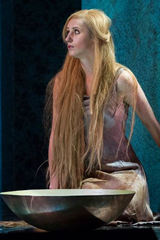| Opera Reviews | 27 April 2024 |
A strange otherworld
|
|
| Debussy: Pelléas et Mélisande English Touring Opera Harrogate October 2015 |
|
|
There are huge spaces between the characters in this dream-like opera, vast areas of backstory incomplete, lots of things unsaid – except, perhaps, by the orchestral passages between the voices. Rarely does anyone touch another – except Pelléas and Mélisande. The three sides of Oliver Townsend’s set are a greeny-blue, which stands for the forest, the garden, the dungeon, the cave. Well may Geneviève (Pelléas’s mother, sung by Helen Johnson) tell Mélisande there are parts of the garden the sun never reaches. Yet Mark Rowland lights faces with a warm spot, like sunrise or sunset, a ray of hope or a last light. A screen at the rear conceals a red-walled room in the castle, where the king Arkel sits in a big leather chair. The unearthly quality comes through strongly in Susanna Hurrell’s Mélisande, the clarity of her voice contrasting with the gruffer tones of Stephan Loges as Golaud, who finds her in the forest and makes her his (second) wife. But what is the origin of Golaud’s gold ring which Mélisande drops down the well, the loss of which seems to coincide with him falling off his horse. Is there a connection with the coronet in the well by which he first found her? Arkel, grandfather of half-brothers Golaud and Pelléas, for all he is almost blind seems to see through the vagueness. Michael Druiett’s portrayal, his calm acceptance of Mélisande and the workings out of fate, is done with great stillness, solidly underpinned by his sonorous bass. Little of what he sees or understands, though, does he share with others. Golaud is already suspicious and co-opts his son Yniold into spying on his step-mother and uncle. Lauren Zolezzi is an attractive boy, neither impudent nor inveigling, her voice supple in her reports of overheard conversations. Even Pelléas mostly keeps his distance from Mélisande. Their first true moment of intimacy is when he persuades her to let down her hair, Rapunzel-like, from the window of her tower-room. Then, Jonathan McGovern’s voice almost brims over with ecstasy; he gets even nearer when he and Mélisande embrace when he tells her he is leaving . Instead, Golaud, whose jealousy and suspicions have been mounting, has trapped and watched them and kills Pelléas before Mélisande’s horrified eyes. As Mélisande lies dying after giving birth to a daughter, she is tended by Arkel and Geneviève. Golaud, grieving for his brother, tries to assuage his guilt by pinning it on Mélisande in the most agitated passage in the opera. Eventually, Arkel tells him to shut up, as Mélisande, now dead, needs silence. Jonathan Berman conducts the small orchestra with delicacy and not a little ingenuity – in Harrogate, the percussion and the harmonium are in opposing circle boxes, with the strings and woodwind in the pit below. Nonetheless, the music flows on in this strange otherworld.
|
|
| Text ©
Catriona Graham Photo © Richard Hubert Smith |

 ‘Ne me touchez pas!’ Don’t touch me, the cowering Mélisande cries as Golaud approaches. It sums up James Conway’s realisation of Debussy’s Pelléas et Mélisande for English Touring Opera.
‘Ne me touchez pas!’ Don’t touch me, the cowering Mélisande cries as Golaud approaches. It sums up James Conway’s realisation of Debussy’s Pelléas et Mélisande for English Touring Opera.






